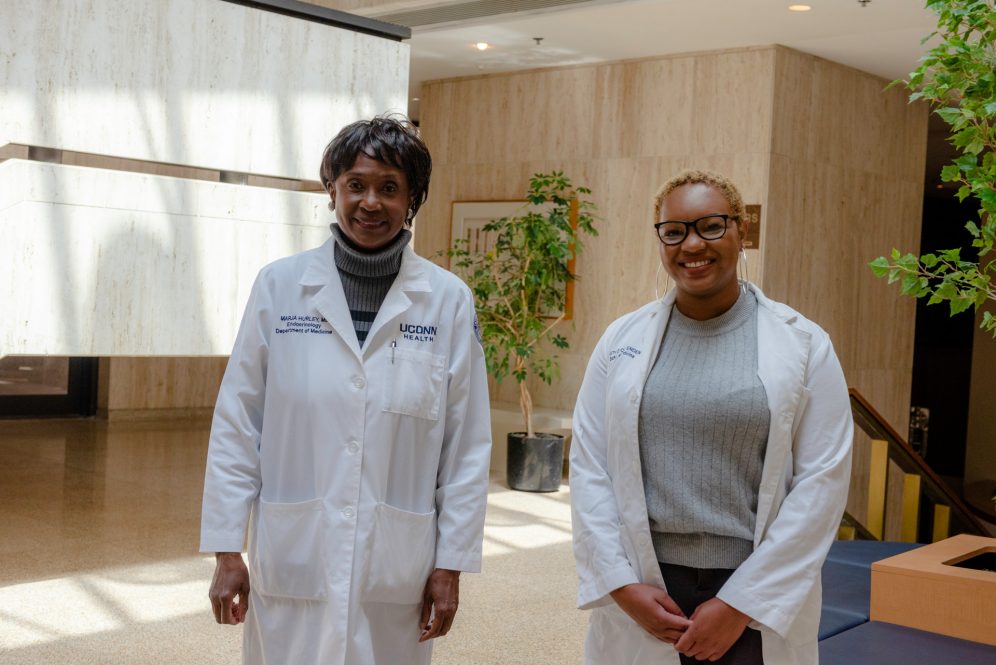Dr. Marja M. Hurley was the first woman of color to graduate from UConn School of Medicine, in 1976, and the first to become a tenured full professor. UConn named the pioneering physician-scientist one of its most outstanding women of its first 100 years. Recently, Hurley was the first Black woman to be appointed a UConn Board of Trustees
Distinguished Professor.
While this trailblazer is renowned for her three decades of NIH-funded bone research, she is a mentor and inspiration for the next generation of physicians, dentists and scientists. For two decades, her 14 distinct Aetna Health Professions Partnership Initiative-sponsored programs have been critical in getting more young people,
of all ethnic and socioeconomic backgrounds interested in medicine and science, to enter medical, dental and health schools, and ultimately to pursue health professions.
The programs have served as a continuous pathway for youth of diverse backgrounds to realize their dream of becoming future doctors, dentists, and health professionals. Impressively, of the nearly 900 youth in the Health Career Opportunity Programs so far, more than 600 have successfully gone on to enter medical, dental school, or other health profession schools, and practice as providers in these fields.
“This program at UConn Health offers opportunities for some of our brightest students from all backgrounds to learn about the incredible opportunities available in the health professions,” said Hurley.
One of the many inspiring Health Career Opportunity Programs students’ success stories is from the Class of 2021’s Faith Crittenden ’14 (CLAS), 29, of Windsor.
She graduated from UConn with an undergraduate degree in chemistry and molecular and cell biology. She is now at Yale for her pediatric residency training where she previously earned her health policy MPH.
“As I am about to enter the health care workforce as a Black pediatric resident, it has been 11 years since a Science Technology Engineering Math (STEM) seed was planted in the classroom of my Connecticut public high school,” says Crittenden, who believes the critical first step to getting more underrepresented minorities in the STEM field is to plant that seed early within the classroom, showing the students there are trailblazers just like them in these fields.
In high school, Crittenden was inspired by Hurley while attending the Doctors Academy, and again as an UConn undergrad Rowe Scholar.
“Seeing accomplished individuals who share identifiable racial, cultural, ethical, and even geographical similarities fosters an ‘If they have done it, I can do it, too’ mentality,” says Crittenden. “I continue to be inspired by Dr. Hurley’s work and accomplishments as a Black woman in medicine with an avid desire to increase the number of underrepresented students in medicine. With this representation within my own medical school, it energized me to continue on a journey to become a physician-advocate.”
Crittenden reports that the Health Career Opportunity Programs is the first place she saw individuals becoming medical professionals with a background, heritage, and ethnicity similar to hers.
“It was the first time I actually felt comfortable seeing myself going into this field and knowing I belong there,” says Crittenden. “I think HCOP is a special program that is essential to increasing diversity within medicine. I believe the most important benefit these programs created was a sense of community in the journey to become a physician.”
Hurley is founding director and associate dean for the Health Career Opportunity Programs, and professor of medicine and orthopedics. At UConn she completed her undergraduate and medical degrees, internal medicine residency and endocrinology fellowship trainings, and joined the faculty in 1986.
To learn more read UConn School of Medicine’s 50th anniversary commemorative report.



